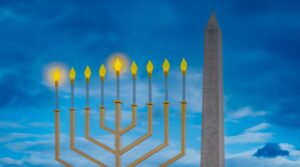By Rabbi Leon A. Morris
(JTA) — Games of dreidel and the consumption of potato latkes and jelly donuts might obscure the deeper meanings of Hanukkah that Americans — Jews and non-Jews — need this year more than ever before.
Hanukkah is a holiday marked by conflicting values in unresolved tension with each other. It mirrors how many American Jews feel these days, more than a year after the Hamas attack of Oct. 7 and amid the ongoing war that Israel has been waging since: uncertain how to balance our sense of loyalty to the Jewish people with our larger liberal and universal outlook, ambivalent about possessing a level of power unknown to us for millennia and confused about whether Jewishness is primarily a religious or national identity.
On the one hand, Hanukkah marks a battle with the Assyrian Greeks to maintain a distinctive Jewish culture in an age of Hellenization that stridently aimed to create a global monoculture. The Maccabees fought for the value of Jewish distinctiveness, the right to live according to commandments that the prevailing Greek authorities viewed as backward. They viewed dietary laws, circumcision and Sabbath rest with derision. The Maccabees’ battle was also aimed at those Jews who internalized this Greek critique of Jewish life and argued the benefits of assimilation.
Among the ironies of the holiday is its observance close to the winter solstice, making Hanukkah with its lights in the darkness more, and not less, like the winter festivals of those whose culture it rejected, first the Saturnalia of the Greeks, and later Christmas — a confluence that is explicit this year, when the first night of Hanukkah falls on what is still Christmas Day. Furthermore, the descendants of the Maccabees took Greek names. They were nourished by Greek philosophy and appropriated Greek terms to make Jewish thought more relevant.
Assimilation is always more complex than we might imagine. As Gerson Cohen’s classic essay “The Blessing of Assimilation in Jewish History” argued, “There are, of course, two ways of meeting the problem of assimilation. The first is withdrawal and fossilization. … [A]n alternative approach [is] one that sought to transform the inevitable inroads of assimilation into new sources of vitality.” There can be little doubt that this balance is complicated and elusive, and an ongoing sense of confusion for many American Jews. Perhaps Hanukkah is itself an opportunity for exploring what the most artful and thoughtful navigation of this narrow middle path should look like in 21st-century America.
The other set of tensions inherent in Hanukkah are between the physical and the spiritual, between human strength and agency and Divine salvation, between the landedness of a nation in its homeland and the portability of its ideas. On the one hand, Hanukkah marks the military victory of the Maccabees over their Assyrian occupational forces. It celebrates Jewish military might employed to protect the indigenous right to remain independent in its land.
Yet the ancient rabbis, traumatized by the defeat of the Bar Kochba revolt in 135 CE, were wary of celebrations of Jewish power. They emphasized an aspect of the Hanukkah story that would seem tangential to the defeat of their colonialist enemies — the miracle of the single cruse of oil that burned for eight days. The military victory couldn’t be entirely removed from the story, but it was the spiritual meaning of Hanukkah that predominated. Underscoring this position was the prophetic reading the rabbis chose for the Shabbat that falls during Hanukkah, Zechariah, who states, “Not by might, and not by power, but by My spirit, saith the Lord of Hosts.”
In America, this spiritual recasting of Hanukkah was accentuated even more. Even as it was framed as a holiday about religious freedom, the physicality of a specific place and land was removed. The connection with Jewish independence over the land of Israel was overlooked. I surmise that many Hebrew school children mistook the locus of the rededication of the Temple in Jerusalem for their own synagogues that they called “temples.” And instead of the traditional hymn of “Maoz Tzur” that expresses a cathartic revenge against our historic enemies and the hopes of rededicating the Temple in Jerusalem, there arose an English rendition that sanitized and universalized its message: “And Your word broke their sword when our own strength failed us.”
Hanukkah this year can hold our unresolved tensions around the meaning of Jewish existence, tensions that find parallels among other Americans of faith. How much can, and should, we be distinct from the larger communities we are a part of? Which values and perspectives can we weave into our Jewish lives, and which should be excluded with vigilance? What is the place of human power and agency in affecting change? How might we reclaim our spiritual inheritance? What gives us faith and hope? What does the existence of a Jewish national home demand of each of us?
We might look to the light of the candles for clarity, but in truth, it may be the swaying and flickering of the flames that underscore the importance of our questioning — and the endurance of our uncertainty.
The views and opinions expressed in this article are those of the author and do not necessarily reflect the views of JTA or its parent company, 70 Faces Media.




